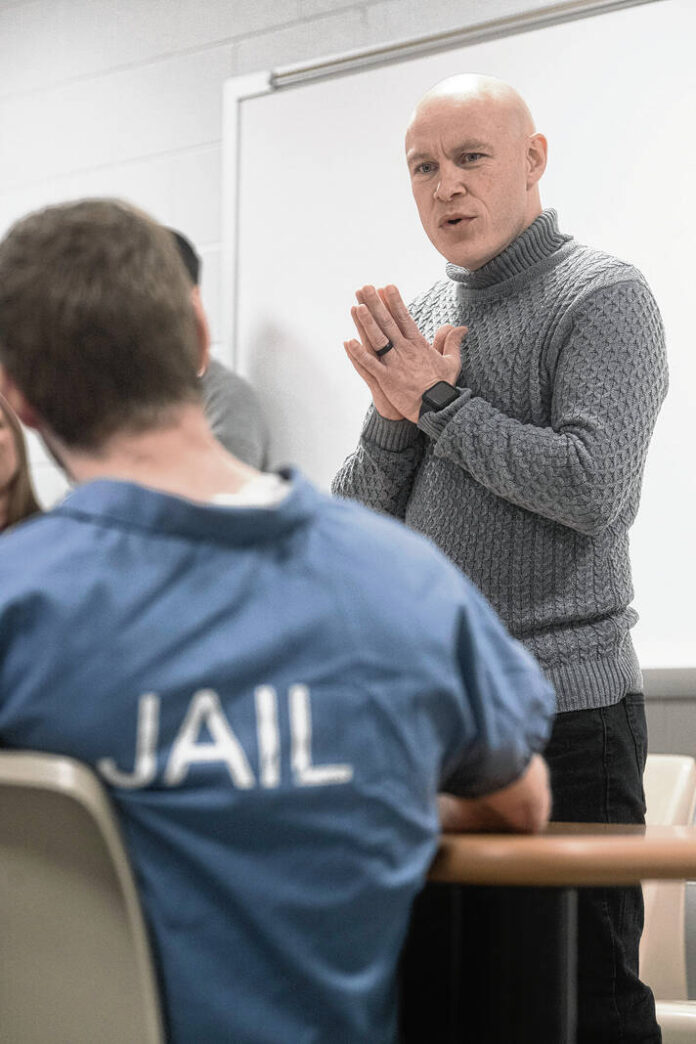
Matthew Graham, a licensed mental health counselor and licensed clinical addictions counselor, leads a therapy session at the Hancock County Jail on Feb. 16.
Tom Russo | Daily Reporter
HANCOCK COUNTY – Fist bump after fist bump, Matthew Graham warmly greeted the group of about a dozen inmates as they entered a classroom in the Hancock County Jail.
Carrying workbooks and folders as they took their seats at tables, Graham reminded them of the rule that no one sits alone.
They were preparing to start a session of moral reconation therapy, or MRT, a program available at the new jail.
“In many areas of our life we go on autopilot, and that has to do with our behavior choices a lot of the time as well,” Graham, a licensed mental health counselor and licensed clinical addictions counselor who has worked in psychology for over 20 years, told the Daily Reporter. “MRT – one of the key principles is having us take a pause and take a look at – what are our core values? Have I been living up to what I proclaim my core values being? Do I need to adopt some new behaviors? Do I need to adapt and be more aware of what’s going on in my life, and then make the necessary changes in order to start living my life in such a way as I want, and avoiding certain consequences?”
The majority of individuals who receive MRT have a significant trauma history, Graham said.
The 12-step program typically takes participants between 12 and 14 weeks to complete, he continued. As of Feb. 16, the Hancock County Jail’s MRT program had 27 graduates. Of those, 16 had been released from jail, none of whom had returned. Their combined total days since release amounted to 670, resulting in a savings of over $50,000 to the county.
Of the 16 graduates, nine had never been sober a day in their adult life, Graham said. All graduates had a primary drug of choice, 11 of whom were opiates and seven methamphetamine, with others being alcohol, cocaine and marijuana.
Graham pointed to a 20-year study on MRT that concluded in 2010 with over 1,000 participants. Nineteen percent had no new arrests, although that included those that did not complete MRT. Six percent of non-MRT treated participants had no new arrests.
Joshua Davidson is a recent MRT graduate at the jail.
“It helps a lot,” he said. “It breaks it down to where you can see where you’ve made the mistakes, and then how to fix them.”
Benjamin Staletovich is nearing graduation in the program.
“The difference is this opportunity,” he said. “Getting this opportunity to confront ourselves and our own choices and decisions.”
During an MRT session at the jail earlier this month, Graham and other participants worked with Joshua Thomas on completing the first step of the program. Standing before the group, Thomas said he learned from his work on the first step that he doesn’t have to tie his identity to mistakes he’s made in the past. He also talked about his struggles with addiction as well as his desire to get better and be there for his daughter.
Thomas’ testimony was filled with apologies and his gaze was often cast down. Graham and Davidson encouraged him to not beat himself up and to look upward.
In the program, a participant completes a step after a vote from others who have completed that step. When it came time to determine whether Thomas had completed the first step, the decision was unanimous.
Moral reconation therapy at Hancock County Jail
115 participants since Sept. 6, 2022
26 graduates (22.6%) – 12 women, 14 men
7 graduates still attending
36 active not yet graduated
22 early release
2 Department of Corrections transfer
2 disciplinary removal
25 dropped out within two steps
2 dropped out in first half
Source: Hancock County Jail as of Feb. 15, 2023




